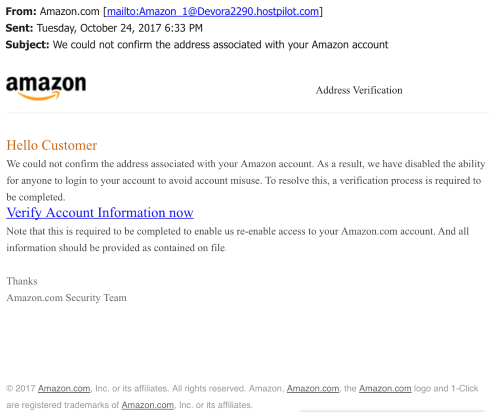The Independent's journalism is supported by our readers. When you purchase through links on our site, we may earn commission.
Amazon scam: Convincing fake emails try to trick people into revealing their bank details
The fraudulent messages look worryingly legitimate

Internet users are being targeted by a fake email claiming to have been sent by Amazon.
The scam message features the company’s logo and even social platform icons, and has been carefully formulated to look as official as possible.
However, it’s designed to trick you into giving out your personal details and visiting malicious websites.
The fake email, which was first spotted by Better Business Bureau, claims that Amazon can’t confirm some of your personal details, such as your identity, payment information or address.
It asks you to update your information by clicking a link, which looks a lot like the gold-coloured buttons that feature on the Amazon website.
Despite its convincing appearance, you should not click it.

Doing so won’t take you to Amazon, but to a third-party website that could try to steal your sensitive data by infecting your computer with malware.
Action Fraud has also noticed the scam, and is advising people to log in to the Amazon site directly, rather than risking your safety by engaging with the potentially dangerous emails.
“Amazon will never ask for personal information to be supplied by e-mail,” the company says.
“Emails from Amazon will never request you to update payment information via a link. Instead, we would include instructions on how to verify your account information, including payment options, through the Amazon.co.uk website.”
Amazon says it would also never ask for your National Insurance number, your bank account information, credit card number, PIN number, or credit card security code, your mother's maiden name or other information to identify you, or your Amazon account password over email.
You can report a scam email to Amazon by following the instructions on the company’s help page.
Join our commenting forum
Join thought-provoking conversations, follow other Independent readers and see their replies
Comments
Bookmark popover
Removed from bookmarks